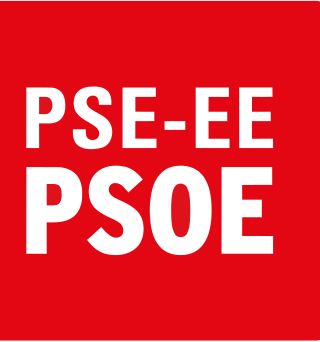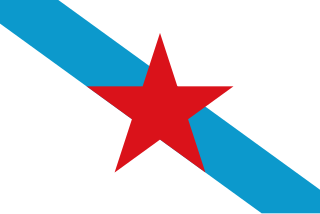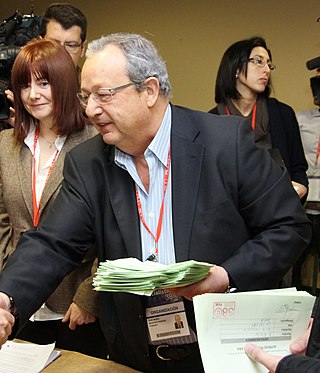
The politics of Spain takes place under the framework established by the Constitution of 1978. Spain is established as a social and democratic sovereign country wherein the national sovereignty is vested in the people, from which the powers of the state emanate.

Basque nationalism is a form of nationalism that asserts that Basques, an ethnic group indigenous to the western Pyrenees, are a nation and promotes the political unity of the Basques, today scattered between Spain and France. Since its inception in the late 19th century, Basque nationalism has included Basque independence movements.

The Basque Nationalist Party, officially Basque National Party in English, is a Basque nationalist and regionalist political party. The party is located in the centre of the political spectrum.

The Union of the Democratic Centre was an electoral alliance, and later political party, in Spain, existing from 1977 to 1983. It was initially led by Adolfo Suárez (1932–2014).

The Spanish transition to democracy, known in Spain as la Transición or la Transición española, is a period of modern Spanish history encompassing the regime change that moved from the Francoist dictatorship to the consolidation of a parliamentary system, in the form of constitutional monarchy under Juan Carlos I.

The 1982 Spanish general election was held on Thursday, 28 October 1982, to elect the 2nd Cortes Generales of the Kingdom of Spain. All 350 seats in the Congress of Deputies were up for election, as well as 208 of 254 seats in the Senate.

Christian Democratic Team of the Spanish State was a political alliance of the Democratic Union of Catalonia, the Federation of Christian Democracy and other regional parties. EDCEE contested the 1977 general elections in Spain in alliance with Catalan centrist forces. The alliance got 215,841 votes.

The Socialist Party of the Basque Country–Basque Country Left is a social-democratic political party in the Basque Country that acts as the regional affiliate of the Spanish Socialist Workers' Party (PSOE).

Spain is a diverse country integrated by contrasting entities with varying economic and social structures, languages, and historical, political and cultural traditions. The Spanish constitution responds ambiguously to the claims of historic nationalities while proclaiming a common and indivisible homeland of all Spaniards.

Both the perceived nationhood of Spain, and the perceived distinctions between different parts of its territory derive from historical, geographical, linguistic, economic, political, ethnic and social factors.

Galician nationalism is a form of nationalism found mostly in Galicia, which asserts that Galicians are a nation and that promotes the cultural unity of Galicians. The political movement referred to as modern Galician nationalism was born at the beginning of the twentieth century from the idea of Galicianism.

Gabriel Cisneros Laborda was a Spanish attorney and politician who is mostly known for being one of the Fathers of the Spanish Constitution of 1978 He is also credited with collaborating in the writing the European Union's Declaration of Human Rights.

José María "Txiki" Benegas Haddad was a Spanish politician for the Spanish Socialist Workers' Party (PSOE). His nickname "Txiki" is Basque for "small".
The General Assemblies is the name of the legislative body (legislature) of the Spanish Basque territories of Biscay, Gipuzkoa, Alava and Navarre, and the elected assemblies to which the Government of each territory is responsible. The northern, French Basque Country, had its own regional assemblies until the Napoleonic period.

Republicanism in Spain is a political position and movement that believes Spain should be a republic.

Eusko Alkartasuna is a Basque nationalist and social-democratic political party operating in Spain and France. The Basque language name means Basque Solidarity and abbreviated as EA. The party describes itself as a "Basque nationalist, democratic, popular, progressive and non-denominational party". The party has adopted the slogan "Euskal Sozialdemokrazia".
A statutory referendum on the approval of the Basque Statute of Autonomy was held in the Basque Country on Sunday, 5 November 1933. Voters were asked whether they ratified a proposed draft Statute of Autonomy of the Basque Country. Article 12 of the Spanish Constitution of 1931 allowed for Spanish provinces to be organized into "autonomous regions", provided that a regional Statute was proposed by a majority of the provinces' municipalities comprising at least two-thirds of the provincial population and that two-thirds majority of all those eligible to vote accepted the draft Statute.
Julen Guimón was a Basque-origin conservative Spanish jurist and politician who played a significant role in the politics of the Basque region until his retirement in 1990. He was among the signatories of the Ajuria Enea Pact which led to the pacification of the Basque Country.














